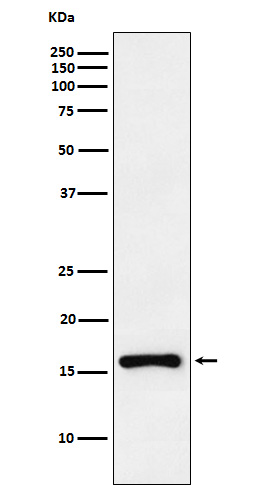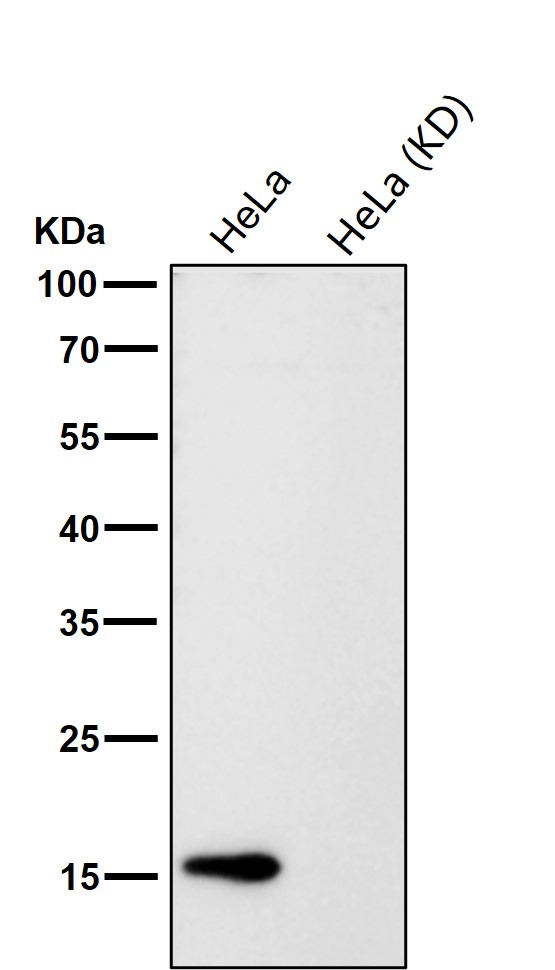

| WB | 咨询技术 | Human,Mouse,Rat |
| IF | 1/20-1/50 | Human,Mouse,Rat |
| IHC | IHC:1/100-1/200;IHF:1/50-1/200 | Human,Mouse,Rat |
| ICC | 1/50-1/200 | Human,Mouse,Rat |
| FCM | 咨询技术 | Human,Mouse,Rat |
| Elisa | 咨询技术 | Human,Mouse,Rat |
| Aliases | Cdkn2c; CDKN6; INK4C; p18; p18 inhibits CDK4; p18 INK4c; p18 INK6; p18-INK4c; p18-INK6; ;CDKN2C |
| WB Predicted band size | Calculated MW: 18 kDa ; Observed MW: 15 kDa |
| Host/Isotype | Rabbit IgG |
| Antibody Type | Primary antibody |
| Storage | Store at 4°C short term. Aliquot and store at -20°C long term. Avoid freeze/thaw cycles. |
| Species Reactivity | Human,Mouse,Rat |
| Immunogen | A synthesized peptide derived from human CDKN2C |
| Formulation | Purified antibody in PBS with 0.05% sodium azide,0.05% BSA and 50% glycerol. |
+ +
以下是关于CDKN2C抗体的示例文献(注:部分信息为模拟概括,实际文献需通过学术数据库验证):
1. **文献名称**:*CDKN2C/p18INK4C Loss Promotes Malignant Progression in Multiple Myeloma*
**作者**:Kulkarni, S. et al.
**摘要**:研究通过免疫组化及Western blot分析多发性骨髓瘤患者样本,发现CDKN2C基因缺失与p18蛋白表达降低相关,提示其缺失可能通过破坏细胞周期调控促进疾病进展。
2. **文献名称**:*Role of p18INK4C in Cell Cycle Arrest and Tumor Suppression*
**作者**:Hashimoto, J.B. et al.
**摘要**:利用CDKN2C特异性抗体验证p18蛋白在正常组织与肿瘤中的表达差异,证实其在G1期阻滞中的作用,并揭示其缺失导致CDK4/6过度活化,驱动细胞增殖。
3. **文献名称**:*Antibody-Based Detection of CDKN2C in Neuroblastoma Prognosis*
**作者**:Sánchez-Martínez, R. et al.
**摘要**:研究评估CDKN2C抗体在神经母细胞瘤中的诊断价值,发现低表达患者预后较差,提示该抗体可作为潜在生物标志物。
4. **文献名称**:*Characterization of CDKN2C Antibodies for Functional Studies*
**作者**:Takeuchi, M. et al.
**摘要**:对比多种商业化CDKN2C抗体的特异性与灵敏度,验证其在流式细胞术和免疫沉淀中的应用,为后续功能研究提供技术参考。
建议通过PubMed或Google Scholar以“CDKN2C antibody”、“p18INK4C”等关键词检索真实文献。
The CDKN2C antibody is a research tool designed to detect the cyclin-dependent kinase inhibitor 2C (CDKN2C), a protein encoded by the CDKN2C gene. CDKN2C, also known as p18INK4C, belongs to the INK4 family of cell cycle regulators. It functions as a tumor suppressor by inhibiting cyclin-dependent kinases 4 and 6 (CDK4/6), which are critical for G1-to-S phase progression. By binding to CDK4/6. CDKN2C prevents phosphorylation of the retinoblastoma (Rb) protein, thereby blocking cell cycle progression and promoting cellular senescence or apoptosis. Dysregulation of CDKN2C, through deletions, mutations, or epigenetic silencing, is implicated in various cancers, including multiple myeloma, pituitary adenomas, and neuroendocrine tumors.
CDKN2C antibodies are widely used in molecular biology and cancer research to study protein expression, localization, and interactions. They enable techniques like Western blotting, immunohistochemistry (IHC), and flow cytometry, aiding in the identification of CDKN2C loss or reduced expression in tumor samples. These antibodies also help evaluate the therapeutic potential of targeting the CDK4/6 pathway in cancers with CDKN2C alterations. Commercially available CDKN2C antibodies vary in host species, clonality, and conjugation, with validation data ensuring specificity and reliability. Understanding CDKN2C's role in cell cycle control and its aberrations in disease underscores its significance as a biomarker and therapeutic target in oncology research.
×